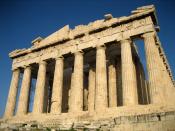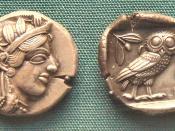The history of Greek Drama:The origins of Greek drama are obscure, but it is known from Early Greek tradition that tragedy, drama, and comedy has evolved from dithyramb, the songs and for the Greek God Dionysus. It is important to understand that drama began in the Greek world as a form of religious ritual, which later became a form of entertainment for the Athenians, from there it evolved. ùGreek drama and theater are theatrical traditions that flourished in ancient Greece between c. 600 and c. 200 BC. By the 5th century BC, theater had become formalized and was a major part of Athenian culture and civic pride. Athenian tragedy, comedy, and satyr plays were some of the earliest theatrical forms to emerge in the world. Greek theater and plays have had a lasting impact on Western drama and culture. òThere are three types of plays; tragedy, comedy, and satyr.
Tragedy can be defined as any play which is a serious drama, lacking comedy. Aristotelian tradition defined tragedy as a drama which concerns better than average people who suffer a transition from good fortune, and who speak in an elevated language. Comedy, in the Aristotelian tradition, is defined as a play that involves average, or below average, people who speak everyday language. Comedy does not need to be funny to be a comedy. Satyr plays are a type of burlesque comedy, usually involving tales of mythology, drinking, and sexuality. (which can be noted by the phallic props that would sometimes be worn to symbolize masculinity, along with mock wooden breasts and bellies to symbolize the feminine form.) ó Eroticism was a important symbol in Ancient Greece, and was commonly shown in Grecian dramas and plays, it can still be seen in pottery, paintings, and some literature that exists today.
Attending a tragedy or comedy in 5th century BC Athens was in many ways a different experience than attending a play in the United States in the 20th century. To name a few differences, Greek plays were performed in an outdoor theater, used masks, and were almost always performed by a chorus and three actors (no matter how many speaking characters there were in the play, only three actors were used; the actors would go back stage after playing one character, switch masks and costumes, and reappear as another character). Plays were funded by the polis, and always presented in competition with other plays, and were voted either the first, second, or third (last) place. Greek plays are outlined differently than modern plays you see today, there was the Prologue, the Parados, which was a intro sung by the chorus. the First Episode (out of many) The first Stasimon, which was something of a commentary after each episode, and the Exodos, which would be the ending, which usually gave a overview of the morals of the story, and sometimes put a comedic twist on the story. In Ancient Greece, at the end of a tragic story, the audience would usually be presented with another story of a comedic or satyr fashion in order to lighten up the mood of the audience. The Romans were noted for this also.
Greek drama has influenced the theater and theatrical productions of the rest of the world, through the development of their architecture, literature, and strategy that is now employed today in modern plays. That continues to entertain us now, as it to the Ancient Greeks then.
ù Aristotle, Francis Fergusson, and S.H Butcher. Aristotle's, Poetics, line 1449aò "Greek Drama" Wikipedia: The Free Encyclopedia. http://en.wikipedia.org/wiki/Greek_drama.
ó Thomas R. Martin, An Overview of Classical Greek History from Mycenae to Alexander


